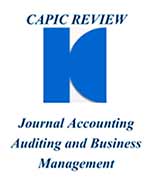Assessment of relevant generic skills in graduated accountants of an argentine university
Published 2022-07-21
Keywords
- generic skills,
- public accountant,
- accounting education
How to Cite
Copyright (c) 2022 Fabiana Ribas, Darío Sánchez Abrego, Alina Girardelli Rivoir, María Victoria Hiadalgo García

This work is licensed under a Creative Commons Attribution-NonCommercial-ShareAlike 4.0 International License.
Abstract
The speed of change in the contents of occupations, as well as the need to deepen new skills, have facilitated the birth of a new concept in vocational training oriented towards the development of labor competencies whilst also identifying that the successful performance of professions requires the development of generic competencies as well as competencies specific to each occupation.
This paper addresses the measurement of the perception that graduates in Public Accounting have on the importance of transversal competences in the exercise of their profession, and on the development that these competences had during their university studies.
To carry out the work we used a descriptive cross-sectional non-experimental design. The survey was limited to graduates from the last 10 years, contacting them via email and collecting the data through an online questionnaire.
In line with other studies, we found that the ability to learn and constantly update themselves emerges as central for the respondents, coinciding with a very good assessment in terms of achievement, which implies that it is not only valued as important, but also is a competition that takes place in the university. We consider that this fact is of great interest for the management of those university careers which can offer specialization or updating programs that allow students to maintain or improve the level of said competence over time
Downloads
References
- Almanza Jiménez, R., y Vargas-Hernández, J. G. (2015). Las Competencias Profesionales y su relación con la empleabilidad de los Ingenieros en Gestión Empresarial egresados del ITLAC. REVISTA ELECTRÓNICA GESTIÓN DE LAS PERSONAS Y TECNOLOGÍA, 8 (22), 17–28. https://www.redalyc.org/articulo.oa?id=477847104002
- Beneitone, P., Esquetini, C., González, J., Marty, M., Siufi, G., y Wagenaar, R. (2013). Informe Final Proyecto Tuning - América Latina: reflexiones y perspectivas de la Educación Superior en América Latina 2004-2007. In Bilbao: Universidad Deusto (Vol. 7, Issue 2).
- Chaffer, C., y Webb, J. (2017). An evaluation of competency development in accounting trainees. Accounting Education, 26(5–6), 431–458. https://doi.org/10.1080/09639284.2017.1286602
- Clares, P. M., y Morga, N. G. (2019). El dominio de competencias transversales en Educación Superior en diferentes contextos formativos. Educação e Pesquisa, 45, 1–23. https://doi.org/10.1590/s1678-4634201945188436
- Dolce, V., Emanuel, F., Cisi, M., y Ghislieri, C. (2020). The soft skills of accounting graduates: perceptions versus expectations. Accounting Education, 29(1), 57–76. https://doi.org/10.1080/09639284.2019.1697937
- Douglas, S., y Gammie, E. (2019). An investigation into the development of non-technical skills by undergraduate accounting programmes. Accounting Education, 28(3), 304–332. https://doi.org/10.1080/09639284.2019.1605532
- Institución. (2007). Estudio sobre el grado de adquisición y desarrollo de competencias no técnicas en las carreras de ciencias económicas.
- González Díaz, E. E., Iván, M., y Castillo, A. (2015). Competencias Profesionales Y La Empleabilidad, Para Egresados Y Titulados De La Carrera De Auditoría. Professional Skills Related To Employability for Graduates Career Audit. Artículo/Article CAPIC REVIEW, 13(2), 125–134.
- González, J. y Wagenaar, R. eds. (2006). Tuning Educational Structures in Europe. Informe Final - Proyecto Piloto Fase 2, La contribución de las Universidades al Proceso de Bolonia, Bilbao.
- González, V., y González, R. (2008). Competencias genéricas y formación profesional: un análisis desde la docencia universitaria. Revista Iberoamericana de Educación, 47(47), 185–209. http://www.rieoei.org/rie47a09.pdf
- Grzesiak, L. (2020). Postgraduate Education for Internal Auditors Versus Employers’ Expectations. Edukacja Ekonomistów i Menedżerów, 55(1), 66–80. https://doi.org/10.33119/eeim.2020.55.5
- Hernández Sampieri, R., Fernández Collado, C., y Baptista Lucio, P. (2014). Metodología de la investigación (6a. ed.). México D.F.: McGraw-Hill.
- International Federation of Accountants (IFAC). (2019). Handbook of International Education Pronouncements (I. F. of A. (IFAC) (ed.)).
- López Ruiz, J. (2011). Un giro copernicano en la enseñanza universitaria : formación por competencias. Revista de Educación, 279–301.
- Mateo, J. L. (2006). Sociedad del conocimiento. Arbor, 182(718), 145–151. https://doi.org/10.3989/arbor.2006.i718.18
- Ribas, F. (2000). La Formación por Competencias. Aplicación al módulo de Análisis de la Información Contable en la carrera de Contador Público. Argentina. Buenos Aires. XXI Jornadas Universitarias de Contabilidad.
- Ribas, F. (2014). Formación por competencias: de la identificación de competencias a las estrategias de formación, nuevos desafíos. Argentina. San Juan. XXXV Jornadas Universitarias de Contabilidad.
- Richón, E., Ribas, F., y Sánchez Abrego, D. (2019). Evaluación y Acreditación de las carreras de Contador Público en Argentina. Una mirada desde el enfoque de competencia laboral. XXXIII Conferencia Interamericana de Contabilidad.
- Roncancio, A. (2015). Las competencias de formación en contabilidad, el caso de Colombia. Revista Finnova, 1(1), 43–59. https://www.researchgate.net/publication/28455221 4
- Sánchez Abrego, D., Richón, E., Ribas, F., Provassi, M. y Málaga, F. (2019). El gobierno corporativo, la contabilidad y los nuevos roles del contador público. XXX Conferencia Académica Permanente de Investigación Contable. Santa Marta, Colombia.
- Stephenson, S. S. (2017). Accounting Community of Practice pedagogy: a course management invention for developing personal competencies in accounting education. Accounting Education, 26(1), 3–27. https://doi.org/10.1080/09639284.2016.1247008


































